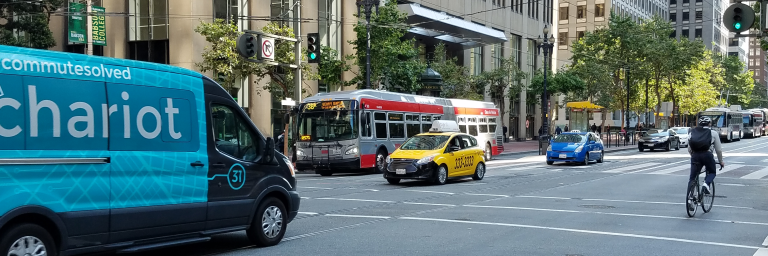On October 17, 2017, the SFMTA Board approved the Private Transit Vehicle (PTV) permit program, including application requirements, permit conditions, fines, and fees. PTV's, often known as jitneys, are shared, privately-operated transportation services that are open to the public and charge individual fares. The PTV permit program applies to companies that operate this type of service entirely within San Francisco city limits. As of early 2018, the only company operating such service is Chariot.
BACKGROUND
Jitneys started operating in San Francisco during World War I, picking up and dropping off passengers along fixed routes across the city. They were soon regulated under the Police Code and restricted to two main routes: one along Mission Street between the Embarcadero and Daly City, and the other along Third and Fourth Streets between Market Street and what's now the Caltrain Station. In the 1970s they underwent a rapid decline when the City stopped issuing new jitney permits and BART opened along Mission Street. They soon almost entirely disappeared, and after a couple decades only one jitney remained traveling between Market Street and the Caltrain Station at peak times. In 2011, after taxis and other vehicles for hire like jitneys came under the jurisdiction of the SFMTA, the SFMTA Board repealed the old jitney regulations, while leaving a placeholder in the code for new regulations for these types of services to be implemented in the future.
In 2014, several new jitney-like services started operating in San Francisco, taking passengers in buses and vans along fixed-routes for individual fares. Of these, Chariot is still operating. These services, now called PTVs, provided a new way of getting around the city in a higher-capacity vehicle. However, the SFMTA also started receiving complaints about aspects of their operations, like stops in unsafe locations, travel on restricted streets, and lack of vehicle accessibility. In early 2017, the SFMTA started working on new regulations to address these issues, and after working with stakeholders for several months the SFMTA passed a package of rules and regulations.
PERMIT CONDITIONS
The PTV permit program's requirements include:
- PTV stops are reviewed by the SFMTA to ensure they are in safe, legal locations
- New PTV routes must complement, rather than compete with, Muni
- PTVs must share GPS and ridership data with the SFMTA
- PTVs must provide equivalent service for people with disabilities
- Labor standards and driver training requirements must be met by PTV providers.
- Limits on vehicle length and age
- Annual permit fees are charged to cover the city’s costs of administering and enforcing the program
- Administrative penalties are charged for permit violations
DEVELOPMENT AND IMPLEMENTATION
The SFMTA Board approved the program in October 2017. One important component of the program requires that new PTV routes complement, rather than compete with, existing Muni routes. The Board asked staff to come back to present on the criteria that the agency will use to determine whether a PTV route duplicates Muni service. In addition, a change to Division I of the Transportation Code requires a vote by the Board of Supervisors to prohibit PTVs from operating without a permit and impose penalties for non-compliance.
- Current
